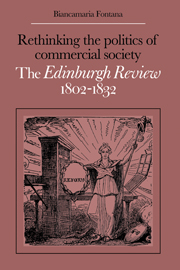Book contents
- Frontmatter
- Contents
- Preface
- Introduction
- 1 Scottish theories of commercial society and the French revolution
- 2 Adam Smith's heritage: the Edinburgh reviewers and the Wealth of Nations
- 3 The definition of political economy: political economy as a social science
- 4 The Edinburgh reviewers and the Whig party
- 5 Commercial society and its enemies: the debate on the First Reform Bill
- Conclusion
- Notes
- Bibliography
- Index
1 - Scottish theories of commercial society and the French revolution
Published online by Cambridge University Press: 14 January 2010
- Frontmatter
- Contents
- Preface
- Introduction
- 1 Scottish theories of commercial society and the French revolution
- 2 Adam Smith's heritage: the Edinburgh reviewers and the Wealth of Nations
- 3 The definition of political economy: political economy as a social science
- 4 The Edinburgh reviewers and the Whig party
- 5 Commercial society and its enemies: the debate on the First Reform Bill
- Conclusion
- Notes
- Bibliography
- Index
Summary
The Edinburgh reviewers and the French revolution
To say that the French revolution and the Napoleonic experience were crucial to the intellectual and political formation of the Edinburgh reviewers is a truism requiring little illustration.
The French revolution of 1789 and its influence on English politics furnished the background to Dugald Stewart's teaching at the turn of the century. For the generation of his pupils – born between the 1770s and the 1780s – the spectacular unfolding of French events, up to the revolutions of 1830 and 1848, remained the constant focus of political reflection. The development of the reviewers' opinions was marked profoundly by the impact of the French revolution upon Scottish politics. In the 1790s the reaction to French events had rapidly resulted in the virtual paralysis of political and intellectual life in Edinburgh. Under the crushing weight of Tory rule and the stranglehold over Scottish patronage exercised by Henry Dundas (1742–1811), the debating societies were virtually reduced to silence. The Whig party, despite the great personal prestige of its leader Thomas Erskine (1750–1823), sank gradually into provincial isolation; while Whig sympathisers saw their chance of acceding to public offices or professional careers drastically restricted. On the publication of his Elements of the Philosophy of Human Mind in 1792, Dugald Stewart had to face accusations of Jacobinism and was induced to retract his previous sympathetic assessment of the thought of Condorcet, then widely held responsible for the September massacres.
- Type
- Chapter
- Information
- Rethinking the Politics of Commercial SocietyThe Edinburgh Review 1802–1832, pp. 11 - 45Publisher: Cambridge University PressPrint publication year: 1985



